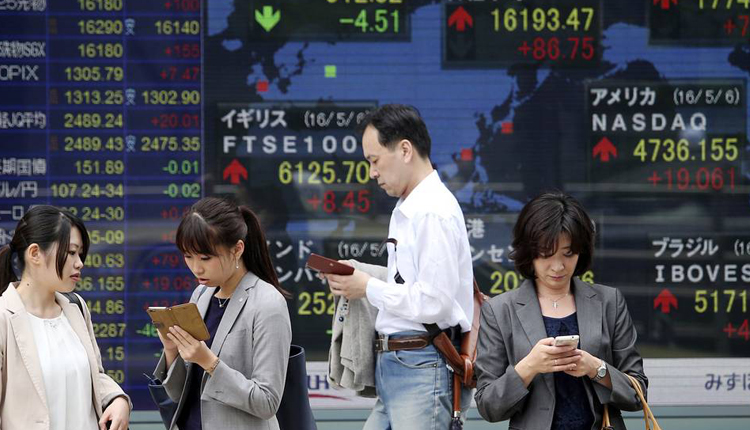Asia stocks mostly gained Friday amid improved investor sentiment following overnight gains on Wall Street.
The mainland Chinese markets, watched in relation to the ongoing trade war between Beijing and Washington, were higher on the day. The Shanghai composite was up about 0.74 percent to close around 2,553.83 while the Shenzhen composite gained 0.758 percent to about 1,313.36. The Shenzhen component also rose 0.611 percent to close around 7,474.01.
Meanwhile, Hong Kong’s Hang Seng index gained about 0.5 percent, as of its final hour of trade.
The moves followed after officials from Washington and Beijing met for trade talks earlier this week — details about the progress were sparse. U.S. and China have halted an ongoing trade war to try and resolve sticking issues on a number of areas. Analysts who spoke to CNBC on Friday were divided whether a deal between the two economic powerhouses would be forthcoming.
“I think (U.S. President Donald) Trump wants to have a win and (Chinese leader) Xi Jinping desperately needs to have a win. So, I think they’re gonna come to some agreement … probably in the first quarter,” Andrew Collier, managing director at Orient Capital Research, told CNBC’s “Street Signs” on Friday.
Collier said, however, trade frictions between Washington and Beijing are unlikely to end as “China clearly … is a threat to the United States and plus it has done many things that many countries disagree with.”
Others did not agree.
“There are some that would argue that the Trump administration needs a deal, given that they’re walking into an election cycle in 2020 … I would respectfully disagree,” James Sullivan, head of equity research ex-Japan at J.P. Morgan, said. “What the Trump administration needs to do is incite his base. A deal, by definition, means compromise. Compromise doesn’t incite.”
Rest of Asia mostly gains
Elsewhere in Asia, Japan’s Nikkei 225 rose 0.97 percent to close at 20,359.70 while the Topix index gained 0.51 percent to finish its trading week at 1,529.73.
Shares of Fast Retailing, the company behind the Uniqlo chain of apparel stores, surged 6.19 percent despite reporting a more than 8 percent decline in its year-on-year operating profit for the three months ended Nov. 30.
“The results were terrible … probably the worst in the sector and it’s the most expensive stock in the sector … and it’s going up,” Michael Allen, senior vice president of research of Japanese retailers at Jefferies, told CNBC on Friday about Fast Retailing.
e said the company “made horrible mistakes,” beyond just poor weather, which it attributed to explain the lackluster sales figures.
“They knew the weather was gonna be a problem going into this quarter and they picked up massive amounts of inventory and now they’re having to discount it and the second quarter’s going to be worse domestically,” he warned.
Meanwhile, former Nissan Chairman Carlos Ghosn was indicted on two new charges of financial misconduct on Friday. The former auto industry giant had denied earlier charges that had been laid against him during a court appearance this week. Shares of Nissan gained 0.86 percent on the day.
The upward moves in Japan followed even as government data revealed Japanese household spending for November declined more than expected. It fell 0.6 percent compared to a year earlier — economists in a Reuters poll were expecting a drop of 0.1 percent.
South Korea’s Kospi also rose 0.6 percent to close at 2,075.57.
Australia’s ASX 200, however, closed 0.36 percent lower at 5,774.60.
Data released by the Australian Bureau of Statistics Friday morning showed that seasonally adjusted retail sales in the country was up 0.4 percent in November from a month earlier, beating a Reuters poll that predicted a 0.3 percent gain.
Shares of retailers in the country were mixed on the back of that data release; Wesfarmers was marginally lower and Woolworths slipped 0.77 percent. JB Hi-Fi, on the other hand, added 2.57 percent.
“Retail Sales data around this time of year are particularly interesting as consumer spending patterns have been shifting,” Ray Attrill, head of foreign exchange strategy at National Australia Bank, said in a morning note.
He cited the rise of sales days such as Black Friday and Cyber Monday as resulting in households pushing their Christmas and Boxing Day expenditure forward into November.
Dow and S&P 500 on a five-day winning streak
Overnight on Wall Street, the Dow Jones Industrial Average and S&P 500 both notched gains, putting them on a five-day winning streak. The Dow added 122.80 points to close at 24,001.92 while the S&P 500 advanced 0.4 percent to finish its trading day at 2,596.64. The Nasdaq Composite also rose 0.4 percent to close at 6,986.07.
The U.S. moves came despite Federal Reserve Chairman Jerome Powell voicing concern over increasing U.S. debt.
“I’m very worried about it,” Powell said at The Economic Club of Washington, D.C. “From the Fed’s standpoint, we’re really looking at a business cycle length: that’s our frame of reference. The long-run fiscal, nonsustainability of the U.S. federal government isn’t really something that plays into the medium term that is relevant for our policy decisions.”
However, “it’s a long-run issue that we definitely need to face, and ultimately, will have no choice but to face,” he added.
The Fed chief’s comments came as the annual U.S. deficit reaches new sustained highs above $1 trillion, a fact many economists worry could spell trouble for future generations. Annual deficits have topped $1 trillion before, but never during a time of sustained economic growth such as now, raising concern about what would happen if a recession hits.
Currencies
The U.S. dollar index, which tracks the greenback against a basket of its peers, was at 95.365 after seeing an earlier low around the 95 handle yesterday.
The Japanese yen, widely viewed as a safe-haven currency, traded at 108.38 to the dollar after seeing highs below 108 yesterday. The Australian dollar was at $0.7212 after seeing lows above $0.714 in the previous session.


